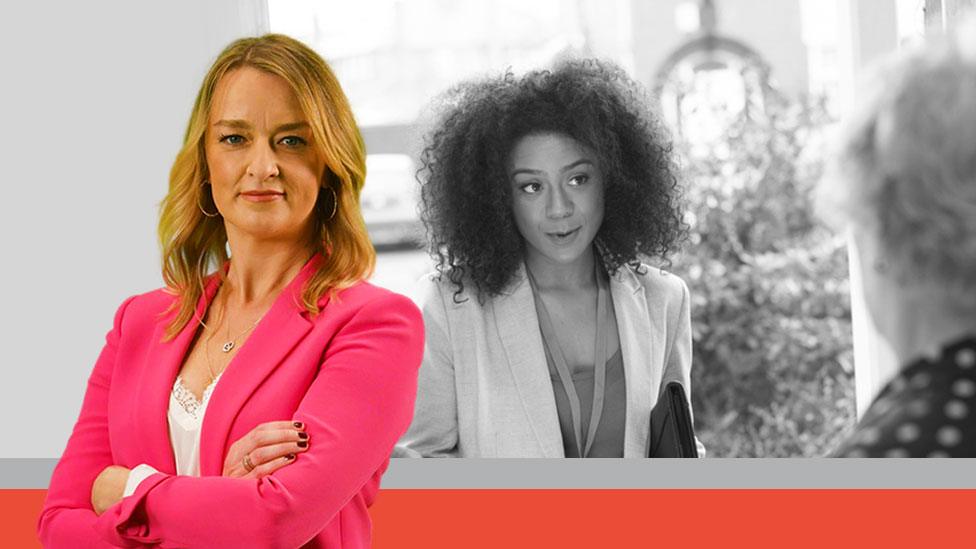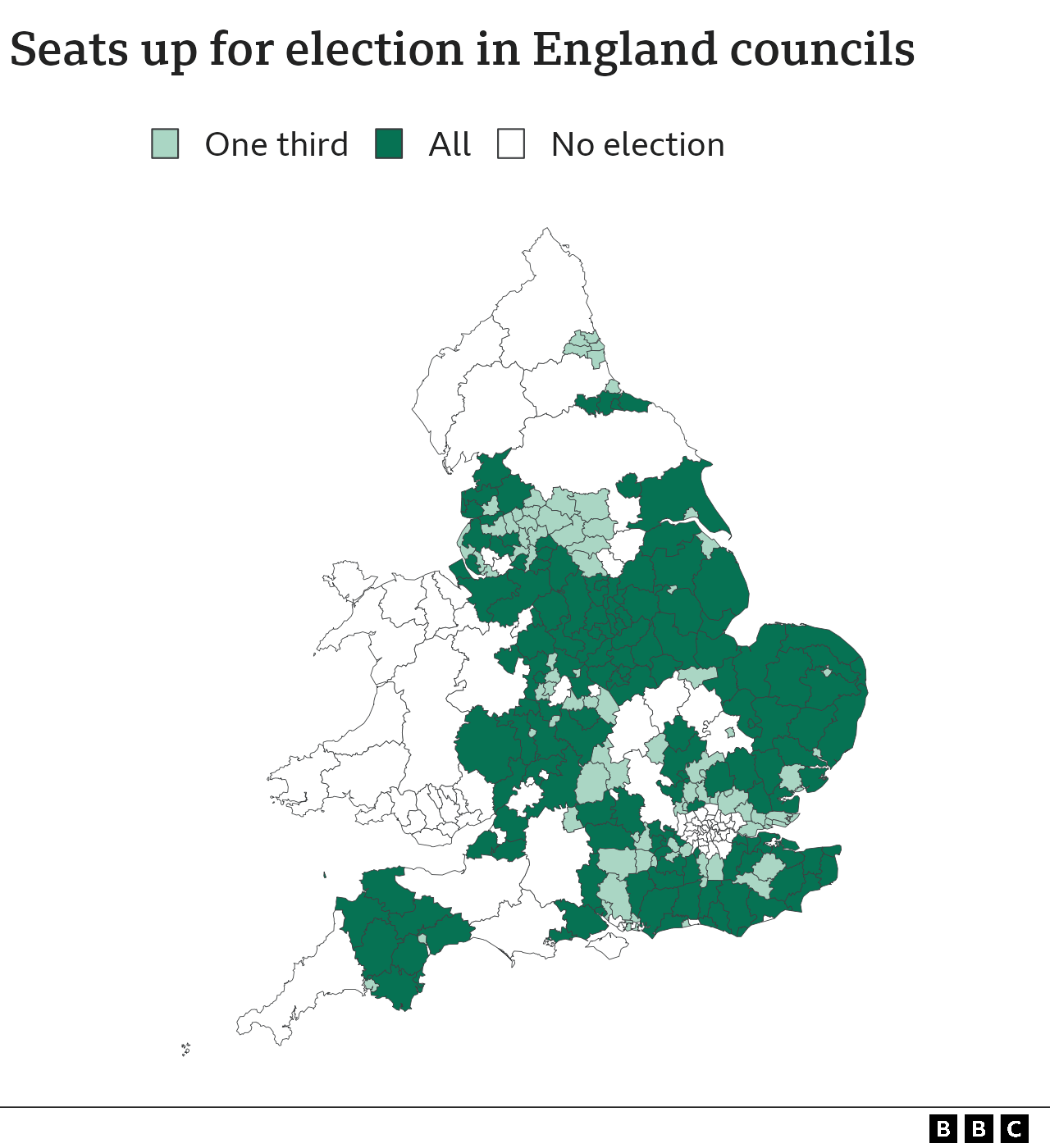Laura Kuenssberg: What could go right and wrong for parties in England's local elections?
- Published

With the elections for thousands of councillors in England on Thursday MPs, councillors and their hardy activists have been knocking on voters' doors over the last few weeks.
Forget about the politics for a second - I've heard some pretty hair-raising stories about what can go wrong in that encounter. And the most common way in which the chat on the doorstep goes awry?
"It's naked people," says one MP. "There's an awful lot of naked", says a long-time political activist. A former cabinet minister remarks in a quintessentially British way that the voter's state of undress always goes unmentioned, "even when they are doing their best to take it to the limits of parental guidance".
Another MP told me he was so flummoxed when a woman in her 50s opened the door leaving little to the imagination that he blurted out, "Is your mum in?", while his fellow campaigner ran off screaming.
One of their colleagues said they had to cover the eyes of their seven-year-old daughter, who was helping with door-knocking, because a man "opened the door stark naked with his dangly bits out". Another recalls, when walking up a drive one evening, "a fully naked man emerged from the garden shed and calmly said hello. I just ran off!"
Canine misadventure seems common. An unimpressed voter in Leicester set their two Alsatians on one MP.
In another encounter, an activist got their hand stuck through a sprung letterbox (letterbox design is a popular subject for experienced doorknockers, I have discovered), then the resident dog bit and hung on to the trapped hand.
And there has been romantic disaster too. One MP discovered a colleague's girlfriend in the house of another man when they knocked on the door - "We had to break it to him - quite awkward" they said - quite!
Greg Hands, the Conservative Party chairman, told me this week he slipped over in the driving rain while out canvassing in Lancashire, then went flying into someone's front door. The voter opened up and proceeded to inspect the door, not Mr Hands, for damage, remarking, "We have only just had it replaced."
Let's think for a moment or two though about what else could go right or wrong for our political parties next week, notwithstanding Alsatians or dangly bits.
Number-cruncher extraordinaire Sir John Curtice has written a primer on the polling here - including the very important reminder that the last time this set of seats were up for grabs in 2019, both the Conservatives and the Labour Party were in dire straits.

On this week's show are Transport Secretary Mark Harper, Labour's national campaign coordinator Shabana Mahmood, Green Party of England and Wales co-leader Adrian Ramsay and actor Nazanin Boniadi
Watch on BBC One this Sunday from 09:00 BST
Follow live updates in text and video here on the BBC News website

And note too, local elections are hugely influenced by, shock horror, local factors and low turnout. But the millions of decisions voters make next Thursday matter to the big political picture.
What could go wrong for Rishi Sunak? Losing 1,000 seats, which Mr Hands himself has suggested is a possibility, would be dreadful.
One of his rivals says that is a "preposterous" suggestion. The Tories did so badly in these seats in 2019 there may not be much further to fall.
But the idea (you got it), of highlighting warnings like that is, if they lose far fewer than that number, stand by for Conservative politicians in studios on Thursday and Friday saying, "Ah ha, look it was so much better than everyone expected."
One former cabinet minister says without doubt "the overall narrative will be hundreds of Tory losses". But what matters beyond the simple numbers are where the losses come - one MP who has been campaigning says "we'll lose a load of seats in the Tory shires because they have never put a leaflet out".
Watch carefully how sticky or slippy Conservative support is in areas that turned blue for the first time in 2019. As the minister says it'll likely again "be a story of two Britains"- by their assessment, how the map was carved up over Brexit will still be a guide.
What could go right for the Conservatives? A much narrower Labour lead based on actual votes cast than that national polls suggest.
I'll say this very loudly again, the local elections are not the general election. But our giant election calculators do come up with an estimate of the national share of the vote if the whole country had gone to the polls.
Conservative strategists have said for many months that Labour's support in the national opinion polls is soft. A much narrower gap in the so-called projected share would suggest that is true.
Whatever happens on Thursday, one thing has already gone right for Rishi Sunak. When he took over, there were mutterings that he had six months to show, before the elections, he could govern, or else.
Fast forward to now, however. Unless something unexpectedly awful happens, it does not seem at all that Mr Sunak's job might be on the line. He has not suddenly reversed the fortunes of the party but he has put the brakes on the decline.
What could go right for Labour? The same experts that suggest the Conservatives could lose more than 1,000 suggest Labour could take around 700 council seats.
Labour MPs scoff at that number, however. One says even "500 would exceed all our expectations - there'd be fireworks at Labour HQ - even Keir would let himself pop a bottle of champagne".
Remember that old game of managing expectations. But pressure is on the party to show what one shadow minister describes as "significant and considerable gains". Anything less than a few hundred more seats would look worrying, a night that had gone wrong.
What crops up regularly talking to Labour sources, however, is where the gains come, not how many.
The party has deliberately put time and effort into council battles that overlay the kind of seat they need to win at the general election. One shadow minister said: "We will judge it by the map, not the number."
The pressure is on to show they can take seats in very different places - challenging in affluent parts of the south, as well as trying to recapture some of their old territory in the north, where voters turned to the Conservatives under Boris Johnson.
There is an opportunity for Keir Starmer to translate months of a polling lead into something real. But his backers want to show support is stacking up credibly right across England to put the party well on track to No 10. It's also a chance for them to decipher whether new campaigning methods - "hardening our activists," one MP said, and trying out more aggressive uses of social media - worked.
Councils are also where you find opportunities for the smaller parties. The Lib Dems are sniffing around, whether it's Surrey or Stockport, trying to build back their base.
What could go right for them? Reaching perhaps 200 gains would be "pretty decent", according to Lib Dem insiders and like all the parties, they are identifying areas where they hope they can be competitive in the general election.
The party hopes to profit from a combination of what they report from the doorsteps as "massive anti-Tory sentiment" and a lack of enthusiasm for Labour, despite its clear national leads in the polls.
Council elections are also a big moment for the Green Party, which has hopes of winning a majority on a council for the first time in Mid Suffolk, and possibly adding around 100 seats overall.
A meaningful general election breakthrough has remained out of reach for the party for so long, so continuing to grow its base in local councils is vital for it. There's also the unknown quantity of the Reform Party standing candidates. Built out of the remains of the Brexit Party, it's hard to know what impact it will have.

These are elections that are driven by what's happening in your street, your neighbourhood, your town or city. They are affected hugely by local events and are not happening in every part of the country.
But they do matter to the psychology of our national politics - the biggest real test so far of Rishi Sunak as prime minister, and the last big vote before the parties will be back knocking doors in a general election.
Conversations on the doorstep - angry pets or naked residents notwithstanding - will make a huge difference to what goes right or wrong.
There is tonnes of information about the elections here - and don't forget, for the first time you need photographic ID to cast your vote.
